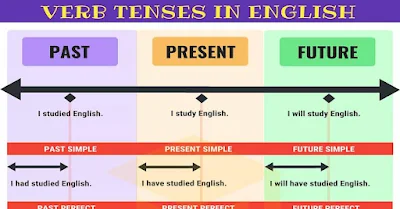Past Perfect vs Present perfect
 |
| had been or has been? |
- The word "Perfect" refers to something "finished & complete".
Past Perfect
💬 Means something began in the past, lasted for some time, then ended. This is entirely in the past.
- He had been in prison from 1900 to 1914. (A specific period of time)
💬 To show that an action happened before a specific time in the past.
- She had established her company before 2008.
- He had never played football until last week.
- They had gotten engaged before last year.
- I had fallen asleep before eight o'clock.
💬 Past Perfect ⤄ vs ⤄ Past Simple:
 |
| past perfect vs past simple |
If two actions happened in the past, we use the tenses this way:
Action 1 - Past Perfect (first action)
Action 2 - Past Simple (Second action that caused or interrupted the first action)
- She stayed up all night because she had received bad news. (First, she received bad news “past perfect”, then, she stayed up “past simple”.)
- They lost many of the games because they had not practiced enough. (non practicing came first)
- Anthony had met Ryan before you introduced him to us at the party.
- You had studied Italian before you moved to Rome.
💬 Reported past simple speech:
Active speech in past simple, its reported (passive) is past perfect.
- (Teacher: "Did you study for exam?"). The teacher asked if we had studied for the exam.
- (The usher: "Did you purchase your tickets?"). The usher asked if we had purchased our tickets.
- (Neighbor: "Did you see my dog?"). My neighbor asked if we had seen her dog.
- (Boss: "It will be a long meeting."). The boss had said it would be a long meeting.
💬 show dissatisfaction with the past. using "wished"
- We wished we had purchased the winning ticket.
- I wished I had told the truth.
- She wished she had seen her friend.
- The boy wished he had asked another question.
💬 Combined with "just": Showing that an event was a short time prior
- She had just left the scene when the ambulance arrived.
- He had just put the dog on the leash when we got there.
- The bus had just left when we got to the stop.
- I had just gone outside when it started to rain.
🔔 Past perfect tense makes it clear that one thing happened before another in the past. The order of events does not matter since the tense makes it clear which event happened first.
Present Perfect
 |
| present perfect vs past simple |
Generally means an action began in the past and has lasted into the present time. That's why it is called "Present Perfect", sometimes "Present Perfect Continuous".
🔁 Shows Repeated action between past and present:
- We have gone to the beach many times.
🔁 An Unfinished action:
- It has been raining a lot this month. (And it is still raining)
🔁 A Finished Action with a result in the present: (Even if the result is not mentioned 👀)
- I've lost my keys. (result: so I can't get into my house)
- She has hurt her leg. (result: so she can't play tennis today)
- They've missed the bus. (result: so they will be late)
🔁 Something happened recently (even if there is no clear result in the present):
- The Queen has given a speech. (She has given the speech recently)
- I've just seen Lucy.
- The Mayor has announced a new plan for the railways.
- The government hasn't declared the new rules yet.
🔁 An action in the past with unspecific time:
- She has lost her wedding ring. (The ring is still lost till now, but we don't know when she lost it, and it's still lost anyway.)
🔁 With "since" and "for": It means "how long" -- Unfinished Action
- I've known Sam since 1992.
- I've liked chocolate since I was a child.
- She's been here since 2pm.
- I've known Julie for ten years.
- I've been hungry for hours.
- She's had a cold for a week.
🔁 With "ever" and "never"
- Have you ever been to Moscow?
- We have never seen that movie.
- George Washington has been a well-respected man in the United States since the late 18th century.
- He has been in prison since 2005. (And he's still in prison)
- The tea set has been in this house for a long time. (And it's still there)
- I have been alive since I was born. (And I'm still alive)
- You have been eating for a while. (And you're still eating)
- They have been dancing for 3 hours, and it doesn’t look like they’re stopping anytime soon.
- Dinosaur fossils have been in the ground for millions of years. (They're still in the ground)
🔔 You CANNOT use present perfect tense with words that tell/specify the time, like (last year, that month, when I was a baby, at 10:00 this morning, etc.). In this case, you need to use present perfect with "since" and "for".
And this chart will help you to remember the tenses
 |
| Verb tenses in English |
And to know more about verbs, you can checkout the verbs lesson
And now, let's Test our Knowledge


0 Comments
Your opinion matters, your voice makes us proud and happy. Your words are our motivation.